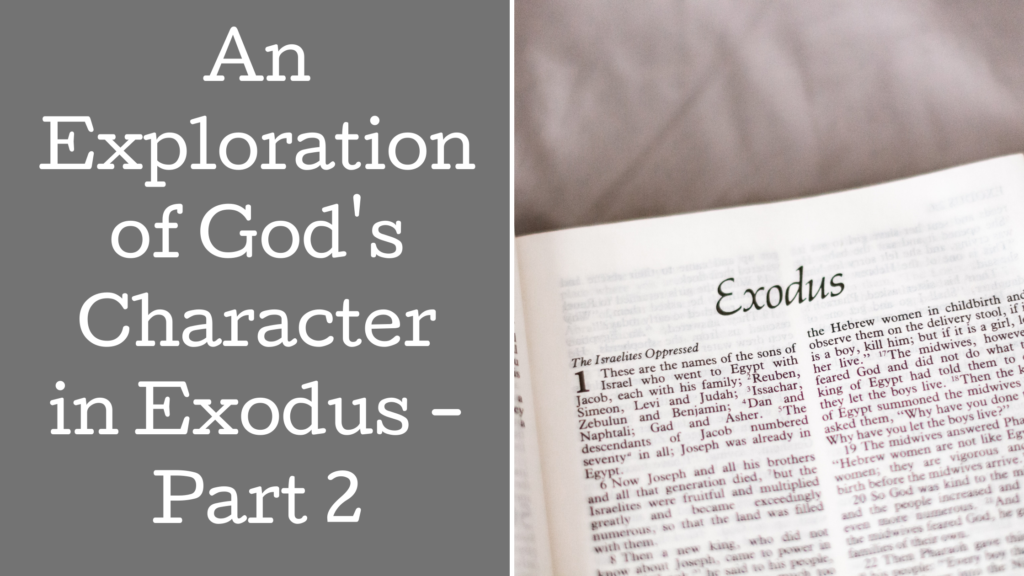We began to take a look at God’s character in the book of Exodus last week. We found out that all three of the Trinity were present, showing various elements of themselves to a nervous and inquisitive Moses. If you missed last week’s post, be sure to read “Exploring God’s Character in Exodus”.
Let’s pick up where we left off. The Lord told Moses the place he was standing was holy ground. Moses clearly saw that something was happening. Some powerful deity was calling out to him. Now it’s about to get more personal.

Exodus 3:6 “Then He continued, ‘I am the God of your father, the God of Abraham, the God of Isaac, and the God of Jacob.’ Moses hid his face because he was afraid to look at God.”
The Lord identified Himself to Moses in a way he could understand. This was the God his ancestors had talked about. Since the Israelites didn’t have a deep understanding of this yet, Moses could only revere the God he had heard about and served. This God was big. He was up in heaven somewhere. There had been evidence of His encounters with the patriarchs of the Israelites, but Moses had never encountered this God before himself.
Notice that it says “I am the God of your father” – This was Amram. Moses’ Hebrew father. God made it personal to Moses. God was saying that I am a living, present God. I am close to you because I am your father’s God. I am the God that you heard about growing up. Though Moses lived in the Egyptian palace for part of his child and adult life, he had spent his first formative years in his biological parents’ house, learning their ways and hearing the stories about their God. Now the Lord was telling Moses He is a present God.
He also identified Himself as a covenant keeping, unchangeable God. He is still the same God that made the promised covenant with Abraham. He met and confirmed it again with Isaac and then with Jacob. He still held true to the covenant He made with them over 400 years ago. God was proving to Moses that keeps His word. He held true to each one of them, and Moses had a glimpse of that evidence with the multitude of Israelites that were alive in his day. Though they weren’t living in the promised land the Lord gave to them, and they weren’t financially well off anymore, due to the slavery of the Egyptians, the people were multiplying abundantly. That much was true for Moses. The rest they believed would come to pass. Moses just didn’t realize how soon.
Exodus 3:7-10 – “Then the LORD said, ‘I have observed the misery of My people in Egypt, and have heard them crying out because of their oppressors, and I know about their sufferings. I have come down to rescue them from the power of the Egyptians and to bring them from that land to a good and spacious land, a land flowing with milk and honey …The Israelites cry for help has come to Me, and I have also seen the way the Egyptians are oppressing them. Therefore, go. I am sending you to Pharaoh so that you may lead My people, the Israelites, out of Egypt.”
There are many elements the LORD shared with Moses in this passage:
“I have observed the misery of My people”
-The Lord observed the Israelites situation. He didn’t just look at it, he took note and studied it. He understood the weight of their misery.
“have heard them crying out”
- He heard every one of their cries. He gave ear to their need. He didn’t ignore it.
“I know about their sufferings”
- He understood the depth of their suffering. He observed it. He heard it. He knew the full capacity of how hard it was for them. He experienced it, as His heart of compassion stirred within Him for His people. Until this point, they looked to themselves. Now they were looking to their God and crying out. Though people’s suffering hurts God’s heart, the sound of dependency and desperation is a sweet sound to Him. It means that people know they need the Lord to help. It’s bigger than what they can handle.
“I have come down”
- This brought the Lord to act. Their cries for help meant they needed a Saviour. God loves being the hero of the story. It meant that He came down and met them where they were at.
“to rescue them”
- Why did He come? He confirmed that it was to rescue them. They called for a hero and He came for them.

“to bring them from that land”
- He would deliver them from that dreadful land of oppression. He would set the captives free.
“to a good and spacious land, a land flowing with milk and honey”
- And not only would He rescue them from the oppression, He would lead them into a flourishing land; a land He promised to them long ago. They would move from slavery into abundance. That’s how much He loved them.
“[their] cry has come to Me”
- God confirms His word. He knows that we forget, doubt, and question what He says. Because of this, He persistently confirms what He said so that we can have the confidence to act on it. He wanted Moses to know the purpose of their meeting. He has heard, seen, and observed the cries of His people. The cries have come to Him because of their desperation. Because they finally looked up.
“I have seen the way the Egyptians are oppressing them”
- God didn’t just see the Israelites either. He noted that He saw the way the Egyptians were treating them. God is just. He wasn’t just going to rescue the Israelites. He was going to bring justice to their oppressors.
“I am sending you”
- God can and sometimes does work on His own. But more times than not, He loves doing His great works through people and angels, as evidenced in the Bible. Why? Because He loves a relationship with all of us. That’s why He created everything in the first place. How boring would it be if He did everything for us and we stayed in a toddler like state? Instead, the Lord loves to teach and use us to become more like Him; to understand Himself and His ways. To be in awe of all He is and can do. We then give great praise to Him for His work in and through us, also allowing us to humbly get a taste of victory through Him. So, instead of rescuing the Israelites Himself, He was about to send a man to assist Him. The Israelites would be able to see and talk with their intercessor (Moses) in order to grow and be led by the Lord. The Lord would talk with Moses, and Moses would share with the people. This would help the people not forget the Lord they were serving. Moses just wasn’t aware of all this yet.
“My people, the Israelites,”
- The Lord claims His special people as His own. He identifies with them. He welcomes them as His family. This amazing, perfect, powerful God was saying that these weak slaves were His special children and He was coming for them. What a beautiful and secure truth.
Now that we’ve heard and seen a piece of God’s heart and identity for the Israelites, we’ll look at the commissioning and budding relationship Moses and the Lord have together in the rest of chapter 3. The Lord unpacks even more of His greatness to Moses as He prepares him to leave Midian and journey back to Egypt to lead God’s people out of bondage.




